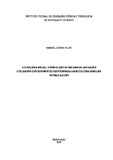Tecnologia social: construção de sistema de irrigação utilizando canteiros inteligentes para a agricultura familiar no Vale Açu/RN

Visualizar/
Data
2023-02-13Autor
Júnior Filho, Samuel
http://lattes.cnpq.br/9664458178632755
Metadado
Mostrar registro completoResumo
In recent years the search for sustainable technology has led the man of the field to innovate the
means of production, especially family agriculture, which has found in social technologies its
important ally in the creation of alternatives that can solve the problems of production and
commercialization, within each territory. Water is a finite resource, without it we do not have
the possibility of food production or life on the planet. Of all the activities that demand the need
for water, agriculture is the activity that consumes the most water worldwide, being responsible
for 70% of all the use made by human beings, and at the same time the most important, since
without it, there is no possibility of food generation. Generating alternatives that will minimize
the impacts of water use, whether family or agribusiness, is a challenge that drives research in
the most diverse sectors in the world. Based on these statements, our work aimed to evaluate
an alternative irrigation system to promote the reduction of the amount of water in vegetable
production. For this, an alternative irrigation system was constructed using gravity and
ascending flow, that is, benefiting the root of the plants. The methodology used was qualitative
in nature, in which it addresses the description of the construction of the system at field level in
orchard II of the school farm of IFRN Campus Ipanguaçu/RN and the boiling of moisture
content using empirical method, with five contents ranging from dry to soaked, with collections
at 3 depths, being 10, 20 and 30cm and the water flow was performed through a hydrometer
with 300, 360 and 420 liters/hour. The results indicate higher humidity in the deeper layers, and
the content ranging from humid to very humid on the days of collection. It is necessary to repeat
the tests, in order to infer further results for the dissemination of technology among farmers and
the use for the production of vegetables.



